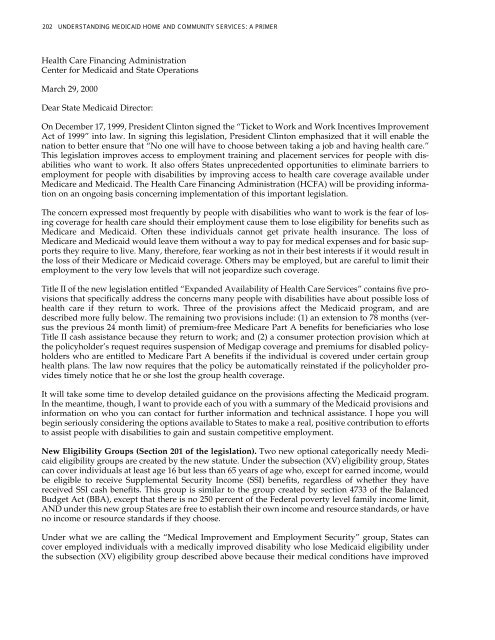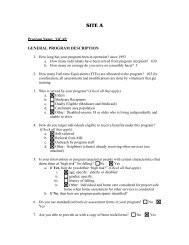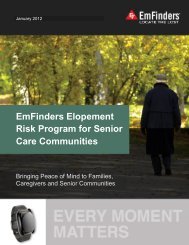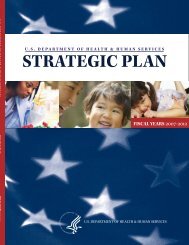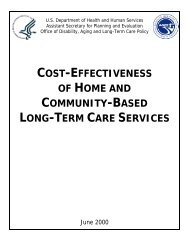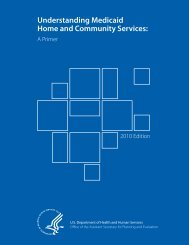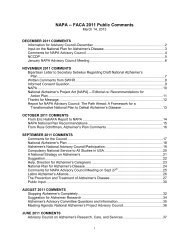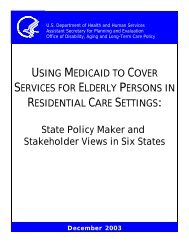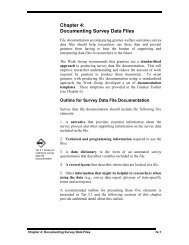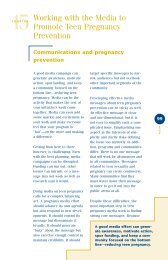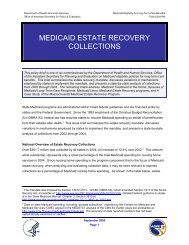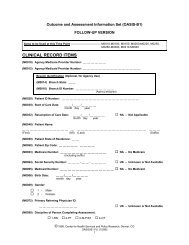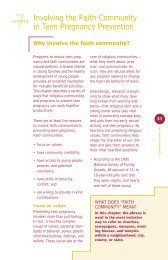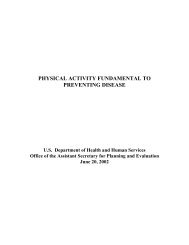Full PDF Version - ASPE - U.S. Department of Health and Human ...
Full PDF Version - ASPE - U.S. Department of Health and Human ...
Full PDF Version - ASPE - U.S. Department of Health and Human ...
- No tags were found...
You also want an ePaper? Increase the reach of your titles
YUMPU automatically turns print PDFs into web optimized ePapers that Google loves.
202 UNDERSTANDING MEDICAID HOME AND COMMUNITY SERVICES: A PRIMER<strong>Health</strong> Care Financing AdministrationCenter for Medicaid <strong>and</strong> State OperationsMarch 29, 2000Dear State Medicaid Director:On December 17, 1999, President Clinton signed the “Ticket to Work <strong>and</strong> Work Incentives ImprovementAct <strong>of</strong> 1999” into law. In signing this legislation, President Clinton emphasized that it will enable thenation to better ensure that “No one will have to choose between taking a job <strong>and</strong> having health care.”This legislation improves access to employment training <strong>and</strong> placement services for people with disabilitieswho want to work. It also <strong>of</strong>fers States unprecedented opportunities to eliminate barriers toemployment for people with disabilities by improving access to health care coverage available underMedicare <strong>and</strong> Medicaid. The <strong>Health</strong> Care Financing Administration (HCFA) will be providing informationon an ongoing basis concerning implementation <strong>of</strong> this important legislation.The concern expressed most frequently by people with disabilities who want to work is the fear <strong>of</strong> losingcoverage for health care should their employment cause them to lose eligibility for benefits such asMedicare <strong>and</strong> Medicaid. Often these individuals cannot get private health insurance. The loss <strong>of</strong>Medicare <strong>and</strong> Medicaid would leave them without a way to pay for medical expenses <strong>and</strong> for basic supportsthey require to live. Many, therefore, fear working as not in their best interests if it would result inthe loss <strong>of</strong> their Medicare or Medicaid coverage. Others may be employed, but are careful to limit theiremployment to the very low levels that will not jeopardize such coverage.Title II <strong>of</strong> the new legislation entitled “Exp<strong>and</strong>ed Availability <strong>of</strong> <strong>Health</strong> Care Services” contains five provisionsthat specifically address the concerns many people with disabilities have about possible loss <strong>of</strong>health care if they return to work. Three <strong>of</strong> the provisions affect the Medicaid program, <strong>and</strong> aredescribed more fully below. The remaining two provisions include: (1) an extension to 78 months (versusthe previous 24 month limit) <strong>of</strong> premium-free Medicare Part A benefits for beneficiaries who loseTitle II cash assistance because they return to work; <strong>and</strong> (2) a consumer protection provision which atthe policyholder’s request requires suspension <strong>of</strong> Medigap coverage <strong>and</strong> premiums for disabled policyholderswho are entitled to Medicare Part A benefits if the individual is covered under certain grouphealth plans. The law now requires that the policy be automatically reinstated if the policyholder providestimely notice that he or she lost the group health coverage.It will take some time to develop detailed guidance on the provisions affecting the Medicaid program.In the meantime, though, I want to provide each <strong>of</strong> you with a summary <strong>of</strong> the Medicaid provisions <strong>and</strong>information on who you can contact for further information <strong>and</strong> technical assistance. I hope you willbegin seriously considering the options available to States to make a real, positive contribution to effortsto assist people with disabilities to gain <strong>and</strong> sustain competitive employment.New Eligibility Groups (Section 201 <strong>of</strong> the legislation). Two new optional categorically needy Medicaideligibility groups are created by the new statute. Under the subsection (XV) eligibility group, Statescan cover individuals at least age 16 but less than 65 years <strong>of</strong> age who, except for earned income, wouldbe eligible to receive Supplemental Security Income (SSI) benefits, regardless <strong>of</strong> whether they havereceived SSI cash benefits. This group is similar to the group created by section 4733 <strong>of</strong> the BalancedBudget Act (BBA), except that there is no 250 percent <strong>of</strong> the Federal poverty level family income limit,AND under this new group States are free to establish their own income <strong>and</strong> resource st<strong>and</strong>ards, or haveno income or resource st<strong>and</strong>ards if they choose.Under what we are calling the “Medical Improvement <strong>and</strong> Employment Security” group, States cancover employed individuals with a medically improved disability who lose Medicaid eligibility underthe subsection (XV) eligibility group described above because their medical conditions have improved


